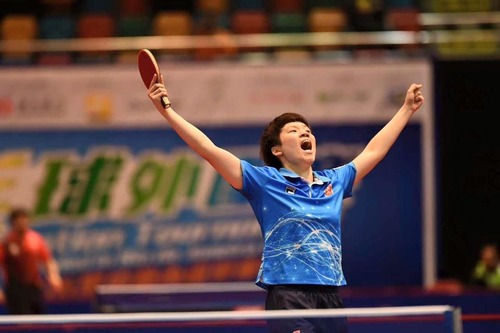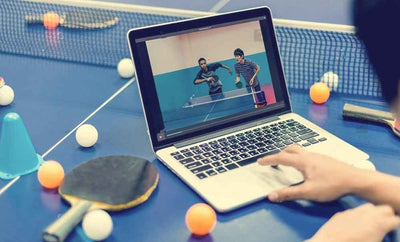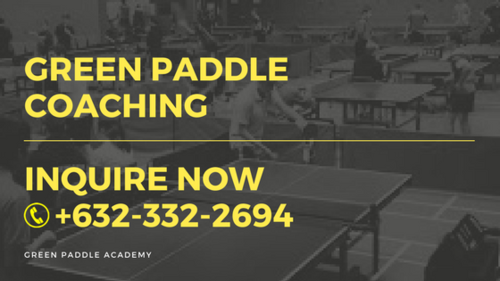
How Can You Beat a Player One-Level Higher Than You?
In the previous article “How to Prepare for a Major Table Tennis Tournament”, we learned how to amply prepare ourselves to heighten our chances up of displaying blue-ribbon performances in tournaments. Now, we dwell into a more typical predicament for every table tennis player engaging in professional play and participating in major table tennis tournaments— encountering better (or seemingly better) players at the other end of the table. The most common setback for table tennis players coming up against superior opponents is battling against nervousness regardless of their tournament experiences. This is not much of a surprise given higher-level opponents are awfully hard to beat even if you are playing your top performance, let alone in instances when you cannot even collect yourself, from the lack of composure.
Before we proceed, it is a requisite thing to understand the very definition of a one-level-higher player than you. More than players with flashier and tackier looking shots, faster offensive strokes and spinner serves, one-level-higher players are just players better at either imposing their games or adapting to their opponents’ play-styles for the longer duration in matches. That goes to say that the only major chunk they have an advantage against you is how they are able to impose or adapt in accordance to each and every single match they engage in. Beyond that, there really isn’t much more to consider, apart from experience (which is already off the scope of this article).
To start off, here are a few handful of measures and tips to help you battle your way through such predicaments and, who knows, might even aid you in defeating players whom you branded off as better than you.
Conquer the battle within you
Being skillful and experienced in table tennis equitably merits being mentally tough and composed. You have to stop being the worst critic of yourself, to stop doubting yourself. This is because when you pursue these negative measures, you effectively hold yourself back, and thus deprive yourself of experiencing and utilizing your full potential.
Conquer the enemy within you. If you regard games against better opponents as just any other game with less probability of winning, then you have already lost in that sense. It is as if you are already giving over the victory to them even before you play! In contrast, just as people say, if you regard it as something special, it may become special sometimes. Who knows, you might be the cause of the next big upset you never reckoned could happen. Upsets are called upsets because they channel an upsetting feeling due to sudden and unexpected loss of renowned players to underdogs; upsets happen in rare and random occurrences.
And, table tennis is not merely about the athleticism and skillfulness of the players; table tennis is also a mind game. That goes to say that if you cannot outdo your better opponents, you can still win by outsmarting them!
But, when you still find yourself having a hard time maintaining mindfulness and composure, remember the saying: “ It’s not about being unafraid. It’s about being afraid and doing it anyway.”
Change the pacing of the game
In this approach, you free the chances of being trounced by your opponent using his/her superior table tennis skills. The least thing that you would want to do is submit and get succumbed to your opponent’s play-style.
As much as possible, force your opponent to play in your pacing’s accordance. Do not knuckle under his/her highlight reel, otherwise you just detriment your chances of rising from the losing end. You have to alter your playing patterns, ball speed and spin. One effective way to practice such is generating unorthodox shots in rare and limited occurrences during the match. Examples would comprise of Ma Long and Koki Niwa’s backhand chop-block, Xu Xin and Michael Maze’s heavy side-spin counter drives, and even Zhang Jike’s shoe drop-shot!
Take the case of ITTF world ranked no. 30 and 15 Kenta Matsudaira and Koki Niwa who, despite being the apparent underdogs in their matches against the powerhouse Chinese table tennis team members, managed to trouble a lot of them and even beat the pen-hold legend Ma Lin in decisive terms and Ma Long in a convincing 4-2 game playing their fractionally unorthodox play-style.
Conceal your weaknesses as much as possible
And expect them to be exploited anytime during the game’s duration. At all costs, do not provide hints regarding your weaknesses (backhand looping, spiny-loop blocking for instance). Otherwise, and most probably, your opponents whose skill levels are higher than yours will drill and feed your weaknesses, impelling you to commit as many unforced errors as possible.
On the other hand, discover your opponents’ weaknesses (and strengths)
It is recommendable to observe your supposed better opponents play against other players and study their strengths and weaknesses. In this sense, you can devise a play-style suited in accordance to your findings. However, this is not necessarily a guaranteed measure to secure you a win; it is still considered than your opponents can and will adapt to your contrast-play given that they are still superior in level than you.
Understand that you have nothing to lose when you encounter them
You have nothing to lose (and everything to gain). It is apparent that your top-shape performance would still not suffice to defeat ideally better players. It is already presumed that you will lose against higher-ranked players beforehand, especially if the margin is really that immense, so there isn’t really anything to worry about. It may even serve as a motivation to fuel you up to defeat higher-ranked players.
And consequently, the expectation is on them; they are the ones expected to win – not you. Hence, the pressure is on them.
The Technical Approach
The Dilemma:
It is a natural tendency for underdogs to get discouraged and intimidated by their opponents, and thus play defensively. Unless you are actually a defensive player or an all-around player at the very least, this is just toxic because not utilizing your play-style in games means minimal composure, mindfulness, and confusion– all the more when you play defensively! And you will eventually, may it be in a conscious or unconscious manner, resort to wild and awkward shots.
The Solution:
To may it be generally aggressive players, defensive players, pen-holders, or unorthodox players, mixing up your serves may help in the early stages of the match as you get to discover which your opponents receive the worst. In this light, you earn the chance of increasing your offensive frequency and controlling the pacing of the ball game. Who knows, a highly deceptive and seemingly easy serve may do the trick as opposed to the very predictable spiny serves. Also, aiming for great ball placements might help.
For most, the more aggressive you get, the better. This goes beyond being able to garner points from power shots and pointy chops because this can also influence the opponent’s focus and composure in a detrimental manner, keeping him/her out of focus because of distraction. And this can also get you into the groove of playing offensively. The more often you utilize it in game, the faster you automate your body into doing the offensive stances and thus decrease your likelihood of unforced errors.
For some who may not be able to work with aggression, for as long as you exploit and drill your higher-leveled opponent’s weaknesses (all the better if using your strengths) and maintain the control of the game’s pacing and a composed mindset, you can increase your likelihood of closing a good fight that might eventually be a win.
Let’s talk about probability
What is the probability that your higher-leveled opponent will experience a bad day and thus minimize the gap your and his skill levels share at the tournament proper? What is the probability that you will be able to pull off a suave performance like never before at the very same day? What is the probability that both these supposed fortunate (in your perspective) events occur at the same time? Misfortune may come to his/her side, luck may come to your side, but what fate is it when both come at the same time?
Statistically speaking, even keeping the aforementioned measures to better yourself in beating and dealing with higher-level opponents aside, you still have some odds in pulling off yourself a win and upset.

Team HKG’s world ranked no. 30 Doo Hoi Kem celebrates after upsetting Team CHN’s world ranked no. 1 Liu Shiwen in the recently concluded 2016 Asia Olympic Qualifications.
Conclusion
In the end, the conclusion of this matter boils down to this: in battles between players with differing but not necessarily distant skill-levels, whoever can impose their game for the longer duration, adapt better to the play-style of the opponent, hide their weaknesses, and moreover exploit their opponents’ will be at the winning edge.
As the saying goes: “to be able to defeat players one level higher than you, you have to become better than them.” The process of becoming better than them encompasses the very attempt of being at par with their skill level– the very rite of passage essential in outlasting them in the future.





Leave a comment